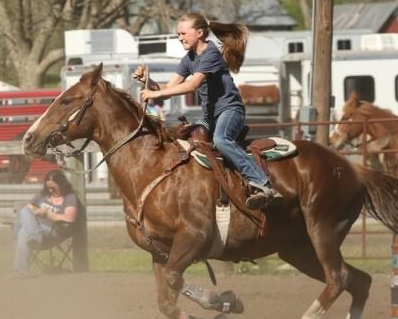Common signs of "misbehavior" in horses can be a direct result of pain
When Korrina Tomes-Hughes—horsewoman, wife and mother of four—acquired a horse who often squealed and kicked out, she told her husband they had a year to solve the issues.
“If a horse isn’t safe, they don’t stay at our house,” she said. “Considering a 1,200-pound horse versus our littlest kid of 40 pounds, there can be no taking chances when it comes to safety.”
It is important to bring up any behavior-related issues with your veterinarian so they can examine your horse for any potential pain and discomfort that may be directing the behavior you’re seeing. And, that’s just what this family did. “You can’t just write [a horse] off for a bad day, or even a bad week. And when you have a mare, you especially have to make sure she is comfortable,” she said.
Pinpointing the problem
To diagnose the issue, Tomes-Hughes’ veterinarian examined the mare, Cash Flip Seven, and soon discovered the mare’s estrus cycle was to blame for her at times poor behavior.
“When she cycles, she cycles hard. It’s painful for her,” said Tomes-Hughes. She was acting up because of the pain she experienced from estrus, which is common, according to a study conducted by University of Pennsylvania School of Veterinary Medicine.
The study noted several behaviors directly linked to overall physical discomfort, which can often be overlooked and labeled as “mareish.” The behaviors included animated bucking, kicking out, kicking walls, backing into or rubbing the hindquarters into walls or objects, self-biting, pawing (other than in anticipation of feeding) and frequent frustration head shaking.
Finding a solution
Tomes-Hughes’ veterinarian recommended two options: spay her or take her out of heat. That’s when they made the decision to put the mare on an altrenogest, which can suppress a mare’s estrus (heat) cycle, reducing undesirable changes in a horse’s behavior and mood. Within three days of the start of treatment, it can effectively suppress estrus in up to 95% of mares.
She said it “has made a world of difference with keeping her out of heat. She backs in the box easier, and doesn’t have ‘box sweat’ or any gate issues. She doesn’t balk at any of this stuff; she goes in and does her job like there is no tomorrow.”
Cash Flip Seven is now the family’s all-around horse—especially when it comes to team roping and barrels. “She’s won a lot in the roping world; everybody loves to rope on her. And she’s that horse who won’t hit a barrel and will make the same run every time for you,” Tomes-Hughes said.
An altrenogest requires a prescription from a veterinarian. Arnold Nagely, DVM, Valley Vet Supply, has also heard success stories from horse owners who incorporate calming supplements into their horse’s daily regimen.
“Calming supplements include specific herbs, vitamins and minerals that can modify the neurotransmitters in the brain, changing the horse’s reaction to stress-inducing environmental factors,” said Dr. Nagely. “Magnesium plays an important role in the nervous and muscular systems. An adequate level of magnesium helps with stress management, muscle tension and irritable, unpredictable behavior. Vitamin-B complex also is important in various metabolic functions within the body and is proven to help relieve anxiety and stress.”
Tomes-Hughes encourages other horse owners not to give up on a horse too soon.
“First, make sure your horse is not hurting and in pain,” she says. “So often, people try to fix a horse’s attitude before fixing pain. Some are quick to write them off, but every person has their bad days, and horses do, too.”
Continue learning about horse health at ValleyVet.com.
